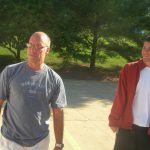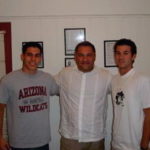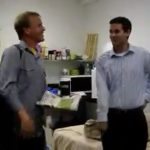Doug Irving, freelance producer, director and cinematographer extraordinaire, has been working in the world of video for the last decade. What advice has he gleaned from ten years?
 “Live life and enjoy it,” Doug says, “But always be ready for the next chapter.”
“Live life and enjoy it,” Doug says, “But always be ready for the next chapter.”
And Doug knows something about turning a new chapter. After six years in a staff position, as director of photography for a Seattle television station, Doug left the security of biweekly paychecks, and struck out on his own. He has spent the last four years freelancing, and in the process has learned that when working alone, he is a business owner and a photographer simultaneously.
“Be in touch with your money,” says Doug, when asked for advice to help others hoping to get into a freelance job.
He notes that boring words, like 401(k), really do offer advantages if they are used efficiently. Married with two children, Doug happily accepts the challenges of his independent life, offering mentoring advice to others hoping to follow his path.
“Ask questions,” Doug says, “People love to give information, but you need to be willing to acknowledge what you don’t know.”
Doug Irvine
A Side Note: Doug was a cameraman during our appearance on Seattle’s hit TV Show, Northwest Afternoon. After the show, with our RV parked right under the Space Needle, we decided to do impromptu interviews. Doug had proclaimed his passion for the camera earlier, so we interviewed him for ten minutes in the RV. It was our first interview that we conducted without prescheduling something. The success of this interview prompted us to schedule whole days of on the spot interviews for the second leg of the tour.
Interview
B: Are you from here?
I’ve been here about ten years.
B: How long have you been in freelance video?
About ten years.
B: Yeah? So as soon as you got to Seattle, when and where was your start?
I went to college here in Seattle. That’s what brought me to the city. The school required that I do an internship. I could go into newspaper, television, or radio. By chance, I talked to someone who had done an internship at a television station. Just to fill the requirement, I decided to try TV. Whatever that was. I didn’t know how TV was made or if it was made.
I remember the first day I came in. The guy took a risk with me by hiring me. Usually you hire someone that knows a little something technical in that field. All I had was photography background. He decided he liked me and took a big risk on an intern that didn’t know anything. That’s where it started.
I remember the second day walking around seeing grown men the age of my dad. I was like, ‘People actually make money playing with video cameras?’ It was just absurd to me at the time.
So you’ve been doing that for the last ten years as a freelancer? When did you become independent and start doing your own thing?
I worked hard to get into the business for a couple years doing internships back to back and volunteering for shoots. Eventually a position opened. Once you’ve got your foot in the door anywhere, you’re above everyone else. All the competition goes away because you know names and they know you.
Basically a job opened up at the television station. I worked there for four, five, six years. I left that and have done freelance for the last four years.
How’s the life of a freelancer?
Well, life always changes. I started out of college without a lot of bills. To freelance when I was just married. Then freelance in another capacity with two kids. My life changes. My work changes. The industry changes. It’s always changing. You’ve always got to adapt and reevaluate what you’re doing and what your demands are in your life.
Was it tough to make that decision to go independent and do things for yourself?
You guys cutting this? I can’t believe I’m asking that because everyone asks that. Ask that question again.
Was it tough to make that leap of faith and go to freelance and leave that steady, secure job you had for five years?
I don’t think it was that hard for me to do it. You know when you’re ready, then you’re ready. You can always find the answer by talking to people. ‘Should I leave? Should I stay?’
I was ready. I think for everyone else at the time, they were like, ‘Man. You’re staffed. You’re growing in your career at a company. You got a lot of guts to risk like that.’
At the time it didn’t feel risky. Looking back on it with a different perspective, I can say, ‘Yeah. That was probably a little risky to quit a staff job I had been at for five or six years. Just to see if I could make a living outside it.’
What’s been the toughest thing that you’ve come across as a freelancer and going out on your own?
Yeah…toughest thing doing freelance. I would like to speak generally that applies to all people, but for me specificially, because of how I’m wired, I’m good in the field. I’m good at lighting and shooting. Running a business is sort of left brain, right brain stuff. Dealing with clients and feeding the hopper so there’s more gigs coming down the line, that’s more challenging to me. That’s running a company. Where I’m more in the field of a DP and lighting guy.
I’ve had to rehone my tools to be a business owner and a photographer at the same time. It’s not a natural fit for me to network and stuff.
A lot of people probably experience that when they’re trying to go out and do their thing. When they have that specific skill that they’re excellent at and all that stuff acoompanies it.
So if you could go back to when you were 22 years old and just tell yourself one piece of advice, what would you say?
To myself? Or other people?
What would you say to yourself at 22 years old if you could tell yourself one thing.
What I would say to myself, and this goes beyond just ‘work.’ It’d be just to be in touch with your money. Your 401k and the things that are really boring. I remember people telling me when I started to put a lot of money in 401k. ‘You’re fresh out of college, you don’t need the money.’ I barely knew what that was. Now that I’m in touch with my money, because I have a family and house and all that, is that I’m thankful I contributed to that for six years.
Just wise decisions. You can live life and enjoy it, but you’ll get to a point that’s a next chapter in life, whether that’s getting married or being a professional in some sort of career. Then all of a sudden you look back and think about whether you were wise, or if you just enjoyed my life. Was I building into my future?
Yeah, I screwed around a lot. Looking back, I was like what the hell did I do with all my time? Because now, I barely have enough time to see friends and stuff. Back then, it’s like I worked 8-4, 9-5, and it was like, what did I do with all that time?
So why do you love your job?
I get to talk with guys like you. It’s so diverse. I never would have met you guys if I had not been a cameraman. I get to meet a lot of people. I like the alternative lifestyle by not working for a company and being a cookie cutter. Although I do appreciate that there are people out there who enjoy that and need to do that. Because not everyone can do what they necessarily love because there’s necessity.
But I’m always marveled by how we’re all different. I’ll look at someone and think, ‘Man, that job sucks! I got a great job.’ And then I’ll talk to that person and they’ll be like, ‘I love my work.’ We’re just so different because they love something, and I don’t. They probably look at me and think that I’m crazy because how fun could not having benefits or any of that junk be?
Ask that question again. There was something else there.
Why do you love your job?
Yeah. I enjoy doing different things every day. It keeps me sharp. For me, the freelance, owning my own business. When you’re a staff person, often more work is just a bummer. The less you the work, the easier day you have, the greater it is. You get paid the same amount.
When you own your own company you become an entrepreneur. The more time you put into it, the more you get out of it. So if you have a full week, that means you’re getting paid for seven days. If a big company asks you to come in on the weekend, well, that’s a bummer because you’re making the same salary but you’re working twice as hard.
So it’s a cool one to one relationship, which I think across the market, people who are freelancers put in a lot because they know their next gig is as only as good as they are right now, today. If they put their best foot forward, they’ll get a call back. If they don’t, they won’t.
If you weren’t doing video, what would you be doing?
If I wasn’t doing video I’d probably being doing home construction. I work so much in film and video and photography that’s it’s often intangible things. I move electrons, listen to sound- very cerebral sort of things.
Construction for me would be very different. Dealing with software programs to dust and saws is something very tangible. It would ground me. Maybe bring me back to the earth or something, not to be too far out there. But to build something, to remodel a house- it’s very tangible. There’s a start and a finish. There isn’t rewrites on scripts. There isn’t different soundtracks that work better or worse. And it’s creative. It’s definitely opened my eyes to how creative you can be by being a concrete worker. I love working with concrete. I’m a photographer, but I can see how a lot of art can come out in it.
What was your name?
Doug Irvine and I’m Director of Photography.
I have one piece of advice. And this might be more general for other people. I think the biggest mistake people make when starting out in new companies or any new profession is that instead of accepting that they know very little in a new career or occupation, and asking the professionals who are usually very willing to give information, they shoot themselves in the foot by not pursuing the professionals and saying, ‘I don’t know.’
So many times I see interns and new people who start and not ask questions. People love to give information. You have all these professionals that will be willing and would love to pour into you. You just need to say, I don’t know what you meant. Or, ‘How do you do that?’
That was one thing I fell into. That’s why I have a passion for that. I tell people not to fool themselves and shoot themselves in the foot and hinder people who want to give you information. Just say, ‘I don’t know.’ Learn while you can.
That’s great advice.






